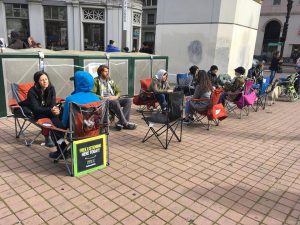Humanity Needs Empathy Now More Than Ever
What would the world look like without empathy?
In a recent LA Times piece, Yale psychologist Paul Bloom opined that empathy is an overrated emotion, one that leads us into all manner of irrational choices and that ultimately leads to burnout. The capacity to put ourselves in each other’s shoes, he argues, is nothing more than an outmoded biological tic that should be relegated to the social realm, with no place in politics.
 Come on, Paul—give us all a little credit. Indeed, many of us do fall victim to emotional exhaustion or over-identifying with a suffering person; we all do at times. Yet Bloom seems to believe that our inability to contain our feelings is a foregone conclusion, thus warranting a wholesale separation of empathy from working toward the collective good. As therapists, professionals on the front lines of mental mobility, we heartily disagree.
Come on, Paul—give us all a little credit. Indeed, many of us do fall victim to emotional exhaustion or over-identifying with a suffering person; we all do at times. Yet Bloom seems to believe that our inability to contain our feelings is a foregone conclusion, thus warranting a wholesale separation of empathy from working toward the collective good. As therapists, professionals on the front lines of mental mobility, we heartily disagree.
In therapist training, we learn that empathy is a diagnostic tool, if you will—an embodied reference point that informs us of what someone may be experiencing emotionally. The art of leveraging this intelligence is nuanced but wholly perceptible; we won’t become overwhelmed by empathy when we understand that what we’re feeling belongs to the other person, not us. In other words, putting ourselves in another’s shoes is both a feeling we can respect and a state we can manage. Connection, in turn, is fostered by our communicating that felt understanding, so that the other person feels heard. We can be sincere in this, regardless of how we ultimately choose to act.
But without empathy, our communication would be just that—hollow, flailing platitudes that actually hinder connection and foster mistrust. We can feel it when someone is disingenuous in relating to our pain; and so empathy, rather than the boogeyman Bloom makes it out to be, is a highly functional ally.
It seems as if Bloom is attempting to help us make more effective political choices and to not become morally clouded from our identification with suffering—noble intentions, to be sure. But we’re human, and empathy isn’t going anywhere; therefore, diminishing its importance or its cultural scope is a misguided solution.
In reality, empathy works in our favor. It’s because of this awareness that we, a diverse group people who work with empathy for a living, have in recent years developed the nonprofit listening project Sidewalk Talk. In a way, Bloom is absolutely right—empathy can get the best of us when we don’t know how to work with it. That’s what we as community listeners are intending to change.
We believe that the dearth of emotional education in our culture is harmful—personally, socially, and politically. In this era of bitterly polarized politics, we are so flooded by our empathic connections that we’ve collectively shut down emotionally. As a result, when our beliefs are challenged—however benignly—we lash out instead of reaching out. We fight with each other from our heads over social media, demanding data and proof and debating the facts, instead of relating from a human-centered place of genuine interest in another’s reality. Our lack of emotional management, not our emotions themselves, fuel these divisions and flights into apathy on one hand, trolling on the other. Bloom, as do too many of us, actually undervalue empathy’s role in making sound long-term decisions.
In the words of Bay Area–based therapist and Sidewalk Talk cofounder Traci Ruble, “interpersonal empathy opens us to collective empathy.” We as mental health professionals listen for a living; we think it’s high time to take that knowledge to the streets. That’s why, in addition to the hundreds of local listening events we hold in cities and towns across the nation, this spring we plan to hold our very first bus tour, making listening mobile. As we spend the first part of April traveling from Chicago down to Atlanta, we hope to listen and learn, while giving those who sit with us the profound experience of being truly heard. We would be thrilled to see Bloom himself sit with us—or better yet, volunteer as a listener.
Empathy isn’t just for enhancing personal relationships or intimate bonding. Empathy supports sound political decisions, too. We know how to harness empathy, and the skill is teachable. Why would we possibly solve our problems without it?
